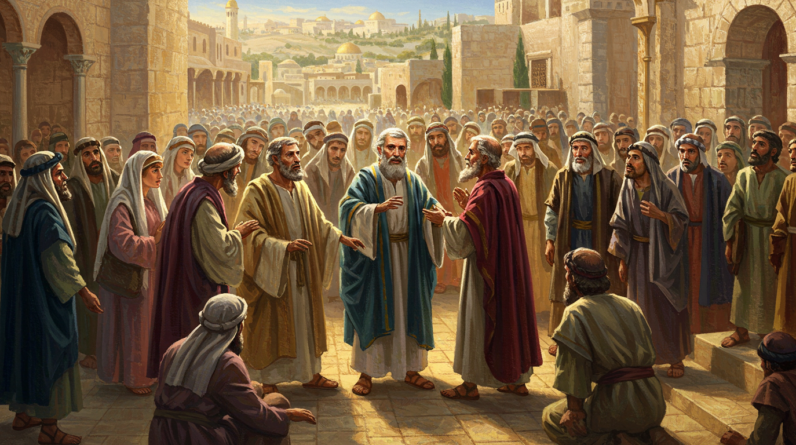Explore the profound transformation of the Philippian jailer in Acts, from a Roman enforcer to a devoted believer, illustrating radical faith and redemption.
The Philippian Jailer: From Opponent to Faithful Believer in Acts
In the heart of the New Testament narrative, stories of radical transformation abound. They remind us of the boundless nature of grace and the incredible changes that belief can facilitate. One of the most compelling stories is that of the Philippian jailer in the Book of Acts. This seemingly ordinary figure, who began as an opponent to Paul and Silas, experiences a profound transformation that turns him into a believer. Let’s delve into his story, unraveling how this individual went from guarding prisoners to being in the company of the saved.
Introduction
The Philippian jailer was initially a symbol of Roman opposition to the burgeoning Christian movement. He was tasked with maintaining order and ensuring the security of prisoners in Philippi, a leading city in the district of Macedonia. His job, though pragmatic, placed him in direct conflict with the nascent Christian church. To him, Paul and Silas appeared as mere troublemakers—foreigners who stirred unrest by promoting their teachings about Jesus Christ. The jailer, driven by duty, upheld Roman law, seeing followers of Christ as disruptors to the status quo.
This man didn’t know it yet, but he was on the cusp of an event that would alter not only his life but also the lives of his household. His journey from a simple enforcer of Roman rule to a devoted follower of Christ provides insightful lessons on faith and redemption—lessons that continue to resonate with many today.
The Encounter
The jailer’s encounter with faith does not begin with gentleness or persuasion but through a rather tumultuous event. Paul and Silas were imprisoned in Philippi after casting out a spirit from a slave girl, which led to an uproar (Acts 16:16-21). Their actions aggravated the girl’s owners, causing them to drag Paul and Silas before the magistrates. The crowd joined in attacking them, and the magistrates, without proper trial, ordered them to be severely flogged and imprisoned.
The jailer, following his orders diligently, placed them in the innermost cell and secured their feet in stocks. As night approached, the jailer settled into his routines, likely expecting a quiet night devoid of further disturbance. However, the verses reveal a surprising turn of events. Around midnight, while Paul and Silas were praying and singing hymns, an earthquake shook the prison’s foundation. The cell doors flew open, and everyone’s chains came loose (Acts 16:25-26). The jailer awoke to chaos—gates open, chains unfastened, and the prospect of escaped prisoners, a dire situation that placed his life in jeopardy under Roman law.
The Turning Point
In a state of utter panic and fearing the worst, the jailer drew his sword, ready to take his own life. The consequences of losing prisoners were unthinkable, and it seemed a merciful end compared to what awaited him. But at this critical juncture, a voice cut through his despair. Paul called out, “Do not harm yourself, for we are all here!” (Acts 16:28). This act of unexpected restraint captured the jailer’s attention, prompting a seismic shift in his heart and mind.
Stunned by both the miraculous events and the integrity of his prisoners, the jailer rushed in trembling, falling before Paul and Silas. He posed a question that has echoed through the corridors of time: “Sirs, what must I do to be saved?” (Acts 16:30). In a moment, the barriers between Roman enforcer and Christian witness collapsed. Paul and Silas responded succinctly and powerfully, “Believe in the Lord Jesus, and you will be saved—you and your household” (Acts 16:31). With these simple yet profound words, the jailer’s journey to faith began.
The Outcome
The conversion of the jailer was marked by immediate and radical changes. No longer was he just a Roman functionary; he was now part of a spiritual family that transcended his previous identity. The jailer invited Paul and Silas into his home, where he washed their wounds with care—a gesture of repentance and reconciliation. This act spoke volumes about his transformation and newfound compassion, as earlier he had ensured their harsh treatment.
His whole household listened to the word of God that Paul shared, and they all rejoiced and were baptized that very night (Acts 16:32-34). Baptism served as an outward symbol of their newfound faith and commitment to follow the teachings of Jesus. The jailer’s home, once a simple family dwelling, became a sanctuary where the gospel was preached and where a burgeoning community of believers received encouragement.
The story unfolds with the astounding evidence that belief doesn’t just change individuals but entire families and communities. We see in this jailer a vendor of Roman justice transformed into a bearer of Christian love and hope, forever altering the course of not only his life but presumably influencing those around him. It is not extensively documented whether the jailer played a further role in the early church, but the seeds sown in his household undoubtedly contributed to the thriving Christian community.

Key Lessons
The narrative of the Philippian jailer in Acts is more than historical recounting—it is a timeless testament to faith, redemption, and divine grace. Here are some key lessons for reflection:
Transformation Is Possible for Everyone
The story reinforces the concept that anyone, regardless of their past or present circumstances, can experience a turning point and embrace a new path filled with hope and purpose. The jailer’s journey from antagonist to apostle of sorts mirrors the endless potential for personal and spiritual renewal within each individual.
Faith Can Overcome Fear
The jailer’s initial reaction was rooted in fear, both of losing his prisoners and the consequent Roman punishment. His choice to embrace faith, however, demonstrated a transcendent shift. This transformation showcases the power of faith to overcome the profoundest of fears and anxieties, clearing the way for peace and trust in the divine.
Acts of Kindness Can Be Transformative
Paul and Silas’s decision to remain in jail despite being granted an escape demonstrates how acts of thoughtfulness can have monumental repercussions. Their kindness not only calmed the jailer’s fears but also led directly to a moment of conversion. It highlights the importance of demonstrating grace and compassion, even towards those who might initially seem like adversaries.
The Ripple Effect of Faith
The jailer’s transition didn’t stop with him; it spread through his household. When one person embraces a new life in Christ, it can set off a domino effect leading to widespread transformation. The story encourages believers to serve as conduits of faith within their circles, touching lives and reshaping communities.
In closing, the transformation of the Philippian jailer serves as a powerful reminder that no heart is too hardened for the reach of God’s love. It offers hope for every person, suggesting that no situation is beyond the redemption table.
As a ClickBank Affiliate, I earn from qualifying purchases.
Acknowledgment: All Bible verses referenced in this article were accessed via Bible Gateway (or Bible Hub).







